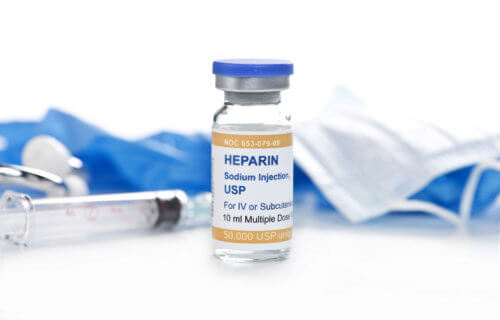TROY, N.Y. — Scientists don’t always find a vaccine for every illness. To this point, that’s the case with the coronavirus pandemic; but researchers say they might be able to trick COVID-19. A new study finds the common drug heparin actually decoys coronavirus and can keep it from making you sick.
Researchers from Rensselaer Polytechnic Institute in New York say heparin can bind to SARS-CoV-2, the virus causing COVID-19. This prevents it from breaking into human cells and spreading. The FDA-approved drug is a blood thinner that usually treats clots in the lungs or legs. Robert Linhardt, who is credited with creating synthetic heparin, says using decoys already helps curb other illnesses like the flu and Zika virus.
“This approach could be used as an early intervention to reduce the infection among people who have tested positive, but aren’t yet suffering symptoms,” the professors says in a media release.
“Ultimately, we want a vaccine, but there are many ways to combat a virus, and as we’ve seen with HIV, with the right combination of therapies, we can control the disease until a vaccine is found.”
Heparin may keep COVID-19 from ‘hijacking’ your body
Researchers say SARS-CoV-2 uses “spike” proteins on the surface of the virus to slice through your cells. The virus grabs on to ACE-2 genes in the body, hijacking cell functions to reproduce the illness. The study finds the virus can be tricked into grabbing other molecules that resemble ACE-2. Once SARS-CoV-2 follows the decoy, it can’t free itself from the bond, neutralizing it.
Researcher Jonathan Dordick explains heparin not only attracts the virus, but forms even tighter and unbreakable bonds than normal antibodies can. On a scale measuring the ties between two molecules, the study finds heparin binds to SARS-CoV-2 at 73 picomoles.
“That’s exceptional, extremely tight binding,” the biological engineering professor explains. “It’s hundreds of thousands of times tighter than a typical antibody antigen. Once it binds, it’s not going to come off.”
Decoys have a successful history
Linhardt and Dordick have experience creating decoys for dangerous viruses. In 2019, the team found a way to trap dengue virus, a serious mosquito-borne illness that causes high fever and rashes.
Before that, the duo created a synthetic polymer which latches on to flu viruses. The discovery lowered the death rate in lab mice with Influenza A infections from 100 percent to 25 percent in just two weeks.
With COVID-19, the study authors suggest heparin can be taken as a nasal spray or inhaled from a nebulizer. They add the drug can then run interference, lowering the odds of developing symptoms.
Fighting coronavirus and future pandemics
Although heparin is typically a blood thinner, the Rensselaer team is also examining non-anticoagulant versions as well. The results from all the varieties of heparin find it’s a promising decoy to use against COVID-19 and future illnesses.
“This isn’t the only virus that we’re going to confront in a pandemic,” Dordick warns. “We don’t really have great antivirals, but this is a pathway forward. We need to be in a position where we understand how things like heparin and related compounds can block virus entry.”
The study appears in the journal Antiviral Research.
Like studies? Follow us on Facebook!
